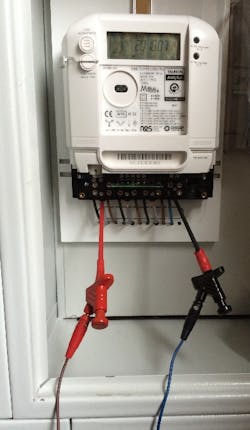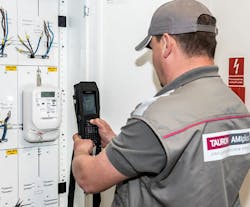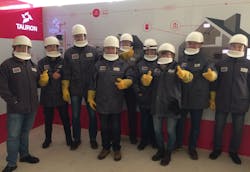In 2014, Poland's utility industry leader Tauron Dystrybucja S.A. created a vision that included implementing a modern, user-friendly electricity smart metering and head-end system (HES), called AMIplus. AMIplus would be a smart metering system allowing automatic processing, transmission, and management of measurement data, as well as two-way communication between electricity meters and distributors — all while giving customers access to current information on electricity consumption.
Tauron Distribution, part of the Tauron Group and the second largest electricity supplier in Poland, commenced the rollout of its AMIplus Smart City Wroclaw project in 2015 in the City of Wroclaw, Poland. The initial large-scale rollout of about 360,000 smart meters was completed in four years (2015 to 2018). Subsequently, Tauron Distribution expanded the system, which now includes more than 400,000 fully interoperable and interchangeable smart meters.
Mariusz Jurczyk, director of the sales department of distribution services at TAURON Dystrybucja S.A, explained that the project focused on how to optimally use the data from smart meters for business activities: "The main goal was to develop an advanced metering infrastructure (AMI) data management platform — a secure and scalable tool that has a flexible architecture. Its implementation would allow for effective use of data from the AMI and its analyses based on innovative mathematical and statistical models."
The AMIplus Smart City Wroclaw project is a multi-vendor project initiated by the DSO, Tauron Distribution, and it is one of the largest AMI and smart metering deployments implemented in Poland to date. This project, which includes multiple meter suppliers, is also one of the largest interoperable smart grid projects in the world. The AMIplus project includes AMI, HES, installation of data concentrators and meters, and customer communication. The main technology is power line communications (PLC), based on the Open Smart Grid Protocol (OSGP) standard, which is a secure and fully interoperable model.
AMI Technology
Tauron Distribution selected, via a public tender, a PLC solution based on OSGP, a device control networking protocol for smart grid applications because of its proven performance and interoperability in smart grid projects around the world. The smart meter hardware was supplied by Networked Energy Services (NES), Apator, and Mitsubishi Electric; and are all certified OSGP compliant. The smart meters provide interoperability by using the same shared infrastructure, including data concentrators and the HES, for providing the smart grid and smart metering functionality required by the DSO. The data concentrators, which are provided by NES, communicate via OSGP-based PLC with the various smart meters and via a commercial mobile network operator, Orange, using LTE technology with the HES.
Security Features
As with any solution involving telecommunications and IT systems, security was a major concern for the AMIplus project. Tauron Distribution uses a variety of security features incorporated into the OSGP standard, including data encryption using the AES128 standard, authentication, and security keys. All data transmission in the system is protected and encrypted, and because each meter has the ability to communicate the metering data to the HAN over a wireless M-Bus radio interface, that is encrypted as well.
Customer Communication Activities
Tauron Distribution determined that they would need to obtain customer support to ensure the AMIPlus project's success. Therefore, Tauron Distribution ran an information campaign that preceded the installation of the new smart meters to prepare customers for the changes. The campaign informed customers about the meter exchange process and also educated them to address their questions and resolve any doubts about the project. Tauron Distribution considers this publicity and communication campaign essential to the success of any smart metering program, and such a campaign needs to include multiple distinct approaches and media.
"When rolling out a project of this nature, it is imperative to get customer support through informed, knowledgeable buy-in," said Jurczyk, expressing the importance of customer acceptance.
A publicity and public information campaign is a major undertaking, requiring considerable investment of time and money. For effective communication, Tauron Distribution:
- Prepared a communication strategy
- Held meetings with local governments, media representatives, and customers to inform them about the program
- Trained installers on how to inform customers about metering installations and AMIPlus
- Prepared a list of questions and answers for helpline workers
- Prepared information about smart metering as well as installation procedures
- Prepared and printed the information and instruction leaflets for customers, printed posters with date and time of installations
- Implemented a media campaign that included print media, the internet, and public exhibitions
Operating Tools
Tauron Distribution uses several tools during both the installation and operating phases to optimize the performance of the network and its devices.
Network management
NES' Grid Operations was installed as the user interface to the HES delivered by NES. It enables Tauron Distribution to securely and remotely manage the smart meters, and it delivers data analysis as well. It provides statistical data, performs network topology automation, enables management of access rights, and collects auditing and diagnosis data. It has a modular structure so that new functions can be added in the future.Topology of the low-voltage network
The OSGP-based technology provides detailed information about the low-voltage network architecture by identifying which voltage phase is being used for PLC transmission and connected to each meter. Using the Automated Topology Management (ATM) tool, the system searches automatically for the optimal communication links among meters. The ATM application tool presents all the connections between the meters as a network topology map. This information assists with troubleshooting, and the capabilities and features of the AMI system allow optimization of the communications paths to accommodate changes to the low-voltage network because of switching of distribution power circuits.
Project Results
During the deployment period, the system was required to reach a KPI greater than 99.5% availability of daily billing readings and load profile data within six days of the collection process. The system continues to perform well and achieve a high level of communication with the smart meters. The collected data consists of four values (active and reactive power for both import and export) in 15-minute energy profiles and energy billing data. In addition, meters provide event logs, and power quality logs and values. The data generated by this project exceeds 150 million measurements each day (more than 50 billion measurements per year) from devices within the distribution network.
In addition to the detailed load profile data, the AMI system provides Tauron Distribution with a variety of benefits, including:
- Remote configurations
- Advanced tamper and fraud detection
- Secure remote firmware upgrades
- Power outage and restoration information
- Remote disconnect and reconnect
- Power quality measurements including voltage, current, power factor
Conclusion
Tauron Distribution's AMIplus Smart City Wroclaw project has achieved its goals and objectives and is considered a successful model to use for future projects. Some of the key lessons and conclusions to be drawn from this project are as follows:
- Providing information to customers about the project, the new meters, and the new functionality is a critical success activity.
- Making the AMI interface more customer-friendly and easy to use is needed to build confidence in the new technology.
- Selecting the right AMI technology and solution that delivers today's required functionality and the ability to support new features in the future is essential for success.
- Always-on security throughout the entire AMI system is an unconditional requirement.
- Providing a dedicated app for customers to use on their mobile devices and computers is important for building energy consumption awareness.
- Delivery deployment schedules requiring meter delivery a minimum of one month before installation allows the rollout to proceed smoothly.
- The availability of well-qualified staff resources for the cleanup process has been a major success factor.
- The installation planning process is very important. Field workers need to be well qualified and trained because their mistakes cost more, having a direct impact on the customer and the subsequent running of the AMI system.
- The value of meter interoperability and the fact that the system is successfully using meters from multiple vendors within one system was a significant achievement.
About the Author
Larry Colton
Colton is a licensed Professional Engineer and certified Project Manager, has received several patents, and participates in industry working groups, including IEC, ETSI, ANSI, IEEE, EU Smart Metering and Smart Grid groups associated with the development of public and industry standards. He has an MBA degree and earned his BSEE degree from Rutgers College of Engineering.




